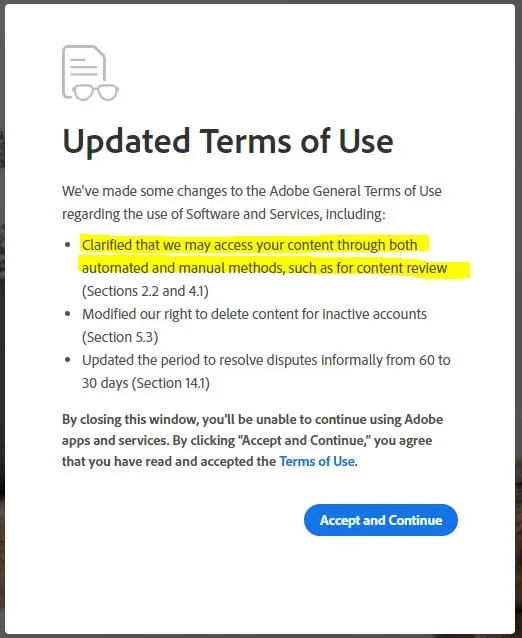All News
Adobe and the Trust Dilemma: A Wake-Up Call on Data Ownership
June 11, 2024
●
2 min

Join HUDI
Unlock the HUDI Ecosystem: Explore our dApp for seamless data and crypto wallet interactions, plus token rewards.
Connect walletAdobe's recent Terms of Service update sparked outrage among users, highlighting the crucial issue of data ownership and trust in the digital age. Explore how this incident underscores the importance of transparency and user data sovereignty.
Adobe and the Trust Dilemma: A Wake-Up Call on Data Ownership
In recent weeks, Adobe has found itself at the center of a significant controversy, underscoring a pervasive issue that continues to plague Big Tech: the trust deficit between technology companies and their users, particularly concerning data ownership and sovereignty in the era of AI.
What Happened?
In February, Adobe updated its Terms of Service (ToS), explicitly stating that it may access user content through both automated and manual methods. This update went largely unnoticed until screenshots of the changes went viral on social media last week.

The viral posts triggered a wave of backlash, with prominent figures like TV food personality Alton Brown announcing their intention to suspend the use of Adobe products. The primary concern among users was the potential for Adobe to use their content to train its generative AI model, Firefly, or to access proprietary projects protected by non-disclosure agreements (NDAs).
Adobe's Response
Faced with the prospect of a mass boycott, Adobe moved swiftly to mitigate the fallout. The company assured users that their content is not used to train its AI models and emphasized that the language regarding content access in its ToS had changed little over the past decade. Despite these reassurances, Scott Belsky, Adobe's Chief Product Officer, acknowledged that the notification's language was "unclear" and highlighted the crucial need for trust and transparency in today's digital landscape.
A Matter of Trust and Data Sovereignty
The Adobe incident is symptomatic of a broader issue: users' growing wariness about how their data is handled. As tech companies race to develop AI capabilities, they are often accused of leveraging user data without explicit consent. For Adobe, which already faces scrutiny for its dominant position in the creative software market, any actions perceived as undermining user trust can have significant repercussions.
Data ownership and sovereignty have become pivotal concerns in the digital age. Users demand greater control over their data, fearing that their personal and professional content may be exploited without their knowledge. This situation is exacerbated by the rapid advancement of AI technologies, which rely heavily on vast amounts of data to function effectively.
Wrap Up
The controversy surrounding Adobe's ToS update highlights the critical importance of data ownership and sovereignty. At HUDI, we firmly believe in empowering users with full control over their data. Transparency, clear communication, and a steadfast commitment to respecting user data are not merely best practices—they are essential principles for building and maintaining trust in the digital age.
In conclusion, the Adobe episode serves as a poignant reminder that tech companies must prioritize trust and transparency. Users must be confident that their data is secure and used ethically. Only by adhering to these principles can companies hope to foster lasting relationships with their customers and navigate the complexities of the modern digital ecosystem.
Related DEALS
Join HUDI Community on Telegram
Reward:
50
Comment a tweet from HUDI
Reward:
40
Related FAQs
What is the best way to protect my passwords?
addHow to Earn Free Crypto Rewards in Zimbabwe?
addHow to Earn Free Crypto Rewards in Zambia?
addHow to Earn Free Crypto Rewards in Yemen?
addHow to Earn Free Crypto Rewards in Vietnam?
addHow to Earn Free Crypto Rewards in Venezuela?
addHow to Earn Free Crypto Rewards in Vatican City?
addHow to Earn Free Crypto Rewards in Vanuatu?
addHow to Earn Free Crypto Rewards in Uzbekistan?
addHow to Earn Free Crypto Rewards in Uruguay?
addSee all FAQs
Copy link
Join HUDI
Unlock the HUDI Ecosystem: Explore our dApp for seamless data and crypto wallet interactions, plus token rewards.
Connect wallet